Fereral Admin Law Judge appointed by Pres. George Bush, Senior.
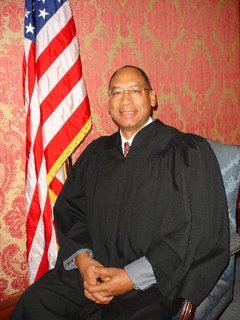
(Only when you have worked alone--when you have felt around you a black gulf of solitude more isolating than that which surrounds the dying man, and in hope and despair have trusted to your own unshaken will--then only will you have achieved. Thus only can you gain the secret isolated joy of the thinker, who knows that, a hundred years after he is dead and forgotten, men who never heard of him will be moving to the measure of his thought--the subtle rapture of a postponed power, which the world knows not because it has no external trappings, but which to his prophetic vision is more real than that which commands an army. (Oliver Wendell Holmes 2/17/1886))
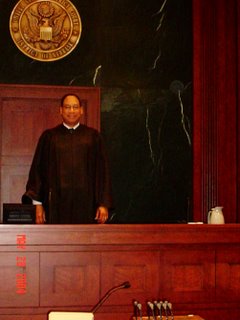

LT London Steverson next worked as a Law Specialist in the 12th Coast Guard District Office, 630 Sansome Street, San Francisco, California and as an Assistant U. S. Attorney for the collection of Civil Penalties under the Federal Boating Safety Act from 1979 to 1982. In July 1982 he became the Chief of the Investigating Division at the Marine Inspection Office New York, NY. In 1986 he was detailed to the National Narcotics Border Interdiction System under the Office of Vice President at the time, [[George Herbert Walker Bush]].
When he retired in June 1988 he became the first African-American Coast Guard Academy graduate to retire as a regular line office from the service, and held the rank of Lieutenant-Commander during his last 10 years of service.
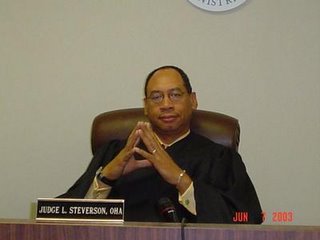
He retired to Dumont, New Jersey and practiced law in New York, with a focus on family law and defending Coast Guardsmen accused of federal crimes. He is a member of the New York State, [[Association of the Bar of the City of New York|New York City]], and Tennessee [[Bar Association]]s.
In July 1990 he was appointed a federal administrative law judge by President [[George W. Bush]]. He was assigned to the Ninth Region of the Social Security Office of Hearings and Appeals in California.



(Judge L. Steverson and Mayor Ric Trejo of Downey, California)

(Judge L. Steverson and Los Angeles County Supervisor, Don Knabe)

(Judge L. Steverson and Sir Sven Wahlroos, Knight First Order, Government of Finland)

(Judge L. Steverson and Admiral Manson Brown, new Coast Guard Commander for 14th District Honolulu, Hawaii.)

(Judge L. steverson, President of the Downey Sister City Association, represents City of Downey, California in Guadalajara, Mexico. Judge Steverson accepts State gifts from Mayor Francisco Javier Ramirez-Acuna, next Governor of Jalisco, Mexico)

Judge L. Steverson, with Augustin Perez and mayor francisco Javier Ramirez-Acuna, of guadalajara, Mexico after a visit to the Jose Cuervo plantation and brewery in Taquila, Mexico.)

(Judge L. Steverson with the Director of the Department of Infants and Families(DIF) in Guadalajara, Mexico after a tour of the facilities. A sizeable cash donation was presented, and 27 orphans were adopted and sponsored by individual members of the Downey Sister City Association. Judge Steverson organized a Padrinos Program to allow members to adopt and sponsor orphans.)

(Judge L. Steverson and the Mexican orphan that he sponsored at the Guadalajara DIF)

(Judge L. Steverson with Mayor Jorge Antonio Catalán Sosa , of Ensenada and family on Mexican Independence Day.)

(Judge L. Steverson, President of Downey Sister City Association, and Mayor Jorge Antonio Catalan Sosa, in Downey, California for the signing of a new Sister City Agrement.)

(Judge L. Steverson and Morris Dees, Director of The Southern Poverty Law Center, at his Civil Rights Memorial.)

(Judge L. Steverson, a 19 year member of the Downey Chamber of Commerce, presents award to new Chamber member. Left-to-right, are Jennifer DeKays, owner of Downey Patriot newspaper, Faye Campbell, Chamber Ambassador, George Ramirez, Steve Allen, Betty Monroy, and Judge Steverson.)
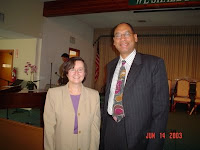
(Judge L. Steverson, Religious Liberty Leader for Hollydale Church, chats with special guest speaker.)

(Judge L. Steverson, a member of the Downey Chamber of Commerce, at a ribbon-cutting ceremony for the opening of a new Downey business.)

(Judge L. Steverson and Dr. Anatoly M. Sagalevitch, the man who planted the Russian flag in the seabed at the North Pole. Dr Salagevitch was at Adventurers Club of Los Angeles to be awarded Adventurer of The Year Award)


(Judge L. Steverson, Treasurer fot the Board of Directors for the Friends of Tahiti, congratulates the winner of the dance competition.)

(Judge L. Steverson and Moses Pulay, a Masai warrior from Kenya at the Adventurers Club annual Night of High Adventure.)

(Judge L. Steverson and James Michael Dorsey, white Masai, author, and whale expert at Night of High Adventure.http://www.jamesdorsey.com/)

(Judge L. Steverson, Dr. Bernard LaFayette, and Ambassador April Foley at the American Corner.)
.JPG)
(Judge L. Steverson and Director of the American Corner)

(The Steverson Collection at the American Corner)

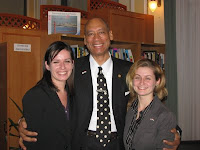
(Judge L. Steverson at the American Corner, Debrecen, Hungary)

(Judge L. Steverson and the Steverson Collection at the American Corner, Budapest, Hungary)

(Judge L. Steverson and the Director of the American Corner, Veszprem, Hungary.)

(JUDGE LONDON STEVERSON RECEIVED STATE DEPARTMENT CULTURAL DIPLOMACY AWARD
The Cultural Diplomacy Award was given to Judge Steverson in April 2009 by the United States Ambassador to Hungary for helping create "a foundation of trust" with the people, which can be built on to reach political, economic, and military agreements; and that combats the notion that Americans are shallow, violent, and godless. He helped to affirm that Americans have such values as family, faith, and the desire for education in common with others; he helped to create a relationship with the people, which will endure beyond changes in government; he helped to reach influential members of the society, who could not be reached through traditional diplomatic functions; and, he donated a large collection of used and rare English books to the American Corners of Hungary.
The State Department Cultural Diplomacy Award is designed to honor distinguished representatives of American culture whose efforts and artistry advance America's goals of mutual understanding and the deepening of friendship between the United States and others.
Since his appointment by President George H. W. Bush in 1990 as federal administrative judge to the Ninth Region of the Social Security Office of Hearings and Appeals, Judge Steverson and family have resided in Downey City, CA, where he was president of the Downey Sister City Association for seven years, and an International Peace Ambassador.)







Cultural diplomacy is the linchpin of public diplomacy; for it is in cultural activities that a nation's idea of itself is best represented. And cultural diplomacy can enhance our national security in subtle, wide-ranging, and sustainable ways. Indeed history may record that America's cultural riches played no less a role than military action in shaping our international leadership, including the war on terror. For the values embedded in our artistic and intellectual traditions form a bulwark against the forces of darkness.
The ideals of the Founding Fathers, enshrined in the Declaration of Independence, the Constitution, the Federalist Papers, and the Bill of Rights, take on new life in the vibrant traditions of American art, dance, film, jazz, and literature, which continue to inspire people the world over despite our political differences. But in the wake of the invasion of Iraq, the prisoner abuse scandal at Abu Ghraib, and the controversy over the handling of detainees at Bagram and Guantánamo Bay, America is viewed in much of the world less as a beacon of hope than as a dangerous force to be countered. This view diminishes our ability to champion freedom, democracy, and individual dignity—ideas that continue to fuel hope for oppressed peoples everywhere. The erosion of our trust and credibility within the international community must be reversed if we hope to use more than our military and economic might in the shaping of world opinion. Culture matters.
Cultural diplomacy reveals the soul of a nation, which may explain its complicated history in American political life: when our nation is at war, every tool in the diplomatic kit bag is employed, including the promotion of cultural activities. But when peace returns, culture gets short shrift, because of our traditional lack of public support for the arts. Now that we are at war again, interest in cultural diplomacy is on the rise. Perhaps this time we can create enduring structures within which to practice effective cultural diplomacy and articulate a sustaining vision of the role that culture can play in enhancing the security of this country. And if, as Secretary of State Condoleezza Rice suggests, America's involvement in Iraq requires "a generational commitment," then our cultural diplomacy efforts require a similar commitment of funds, expertise, courage, and time.
Cultural diplomacy:
• Helps create "a foundation of trust" with other peoples, which policy makers can build on to reach political, economic, and military agreements;
• Encourages other peoples to give the United States the benefit of the doubt on specific policy issues or requests for collaboration, since there is a presumption of shared interests;
• Demonstrates our values, and our interest in values, and combats the popular notion that Americans are shallow, violent, and godless;
• Affirms that we have such values as family, faith, and the desire for education in common with others;
• Creates relationships with peoples, which endure beyond changes in government;
• Can reach influential members of foreign societies, who cannot be reached through traditional embassy functions;
• Provides a positive agenda for cooperation in spite of policy differences;
• Creates a neutral platform for people-to-people contact;
• Serves as a flexible, universally acceptable vehicle for rapprochement with countries where diplomatic relations have been strained or are absent;
• Is uniquely able to reach out to young people, to non-elites, to broad audiences with a much reduced language barrier;
• Fosters the growth of civil society;
• Educates Americans on the values and sensitivities of other societies, helping us to avoid gaffes and missteps;
• Counterbalances misunderstanding, hatred, and terrorism;
• Can leaven foreign internal cultural debates on the side of openness and tolerance.
Cultural diplomacy is also defined as the ample variety of public and private initiatives originating in the United States, and exported abroad with the intention of exerting influence on the cultural and political elites of other countries.
The initiative sought to create a friendly appreciation of the United States policies through the reproduction of American values, institutions and beliefs among foreign elites, including exchange programs as well as initiatives to be developed abroad, affecting the areas of education, scientific research, culture at large, professional training, public and private management, labor, military, sports, and political development, among others. Even when many of the programs were not directly managed by the us diplomatic service, I assume that it is safe to say that the us Executive had a fair knowledge of every American initiative going on in a certain country. I would add that even when more than half of the American programs abroad were privately funded by the early 1960s, the majority of them shared the Cold War objectives of the us Government, and relied heavily on public informational or political support. Furthermore, the largest private initiatives in the area of cultural diplomacy, economically speaking, were developed in close coordination with the American State Department.
The decisive intervention of President Eisenhower in favor of cultural diplomacy
after 1955 not only strengthened the initiative of the Executive but also helped
diffuse the political confrontations on the issue. President Eisenhower took the
leadership of the area when he launched the Baylor University Proposals of 1956,
which claimed for a major participation of the private sector. In addition, the President encouraged educational and private groups to open new programs that would
contemplate the immediate needs of other peoples of the world. Among other initiatives, he created “Foreign Student Day,” launched the People-to-People, and Sister City Association Program and in 1957 supported the Inter-University Committee, which exchanged students with the Soviet Union. Moreover, the government’s emphasis on technical assistance and economic aid often combined efforts with international education, as in the case of the training of foreign experts in us universities through the International Cooperation Administration (ica).Furthermore, the apparent intent of the designers of United States cultural diplomacy to put more weight on the effort in private hands may be better appreciated if we consider these actions together with President Eisenhower’s proposals, made at Baylor University on May 26, 1956. On that occasion, the President “made a plea for greater cooperation between the American people and peoples abroad, announcing ‘strong governmental action to assist foundations, universities, and other private groups desirous of increasing support for educational programs abroad”.




.JPG)


(Judge and Mrs Steverson celebrate the 233rd Anniversary of America's Independence Day)

(Judge London Steverson addresses the students at Pannon University, Veszprem, Hungary during America Week on the subject "The Importance Of An Independent Judiciary" in May 2009)

(Judge London Steverson addresses the students at Pannon University, Veszprem, Hungary during Black History Week 2010 celebration on the subject Black Heroes and Why We Observe Black History Month)
Labels: First Black Academy Graduates.


11 Comments:
Only when you have worked alone--when you have felt around you a black gulf of solitude more isolating than that which surrounds the dying man, and in hope and despair have trusted to your own unshaken will--then only will you have achieved. Thus only can you gain the secret isolated joy of the thinker, who knows that, a hundred years after he is dead and forgotten, men who never heard of him will be moving to the measure of his thought--the subtle rapture of a postponed power, which the world knows not because it has no external trappings, but which to his prophetic vision is more real than that which commands an army. (Oliver Wendell Holmes 2/17/1886)
JUDGE LONDON STEVERSON RECEIVED STATE DEPARTMENT CULTURAL DIPLOMACY AWARD
The Cultural Diplomacy Award was given to Judge Steverson in April 2009 by the United States Ambassador to Hungary for helping create "a foundation of trust" with the people, which can be built on to reach political, economic, and military agreements; and that combats the
notion that Americans are shallow, violent, and godless. He helped to
affirm that Americans have such values as family, faith, and the desire
for education in common with others; he helped to create a relationship with the people, which will endure beyond changes in government; he helped to reach influential members of the society, who could not be
reached through traditional diplomatic functions; and, he donated a large collection of used and rare English books to the American Corners of Hungary.
The State Department Cultural Diplomacy Award is designed to
honor distinguished representatives of American culture whose efforts and artistry advance America's goals of mutual understanding and the deepening of friendship between the United States and others.
Since his appointment by President George H. W. Bush in 1990 as
federal administrative judge to the Ninth Region of the Social
Security Office of Hearings and Appeals, Judge Steverson and
family have resided in Downey City, CA, where he was president
of the Downey Sister City Association for seven years, and an International Peace Ambassador.
History is an account, mostly false, of events, mostly unimportant, which are brought about by rulers, mostly knaves, and soldiers, mostly fools. (Ambrose Bierce)
In the end, all history is memory and gossip.
“History is the version of past events that people have decided to agree upon.”
Napoleon Bonaparte quotes (French General, Politician and Emperor (1804-14). 1769-1821)
Never doubt that you can change history. You already have. (Marge Piercy)
The very ink with which history is written is merely fluid prejudice. (Mark Twain)
The past actually happened but history is only what someone wrote down. (A. W. Brown)
History is a vision of God's creation on the move. (Arnold J. Toynbee)
History is a gallery of pictures in which there are few originals and many copies. (Alexis de Tocqueville)
Be assured those will be thy worst enemies, not to whom thou hast done evil, but who have done evil to thee. And those will be thy best friends, not to whom thou hast done good, but who have done good to thee. (Tacitus)
Post a Comment
<< Home